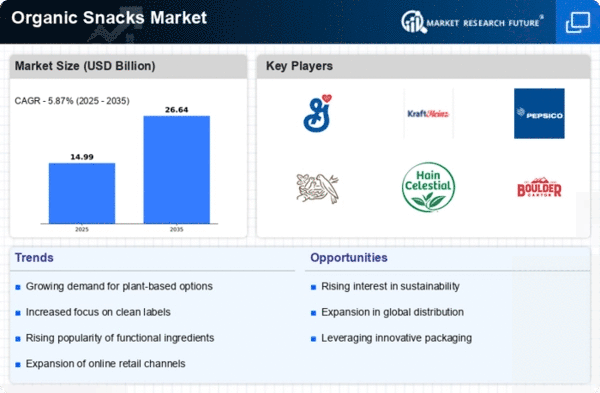Top Industry Leaders in the Organic Snacks Market

Strategies Adopted by Organic Snacks Key Players
The organic snacks market has experienced substantial growth driven by the increasing consumer demand for healthier and sustainable food options. This competitive landscape is marked by a mix of established players and emerging companies, each strategically navigating the market to gain a competitive edge. A comprehensive analysis involves examining the strategies adopted, key players, market share analysis factors, new entrants, industry news, investment trends, and recent developments, particularly .
List of Key Players
- YummyEarth, Inc.
- 8 Rabbits
- Utz Quality Food, LLC
- Late July Snacks LLC
- Eat Real
- Beanitos Inc.
- Creative Snacks Co.
- Peeled Snacks
- My Super Foods
- NurturMe
- Clif Bar & Company
- Sprout
- Annies Homegrown Inc
- Navitas Organics
- Clean Labeling: Emphasis on clear and concise ingredient lists to meet the demand for transparency and authenticity.
- Sustainability Practices: Integration of sustainable sourcing, packaging, and production processes to align with eco-conscious consumer preferences.
- Product Diversification: Expansion of product portfolios to include a wide variety of snacks, catering to diverse consumer tastes.
- Health and Wellness Positioning: Marketing strategies centered around the health benefits of organic snacks, targeting health-conscious consumers.
Market Share Analysis
- Brand Reputation: Established brands benefit from consumer trust in quality and organic authenticity.
- Distribution Channels: Accessibility through both traditional retail and online channels influences market reach.
- Product Innovation: Companies that consistently introduce new and innovative products gain a competitive advantage.
- Price Competitiveness: Balancing premium organic offerings with competitive pricing is crucial for market penetration.
- Certifications and Compliance: Adherence to organic certifications and compliance with industry standards contribute to brand credibility.
New and Emerging Companies
- Stryve Foods: An emerging player in the organic snacks market, known for its focus on protein-packed snacks, including beef and turkey bites.
- YumEarth: Specializes in organic and allergen-free snacks, such as organic gummy bears and licorice.
- Thrive Tribe: Offers organic and paleo-friendly snacks, including nut and seed clusters.
Industry News and Current Company Developments
- Acquisitions and Partnerships: Notable acquisitions and strategic partnerships have been witnessed, enabling companies to strengthen their market presence and expand product offerings.
- Rising Demand for Plant-Based Snacks: The industry has seen a surge in demand for plant-based organic snacks, leading to product launches and expansions in this segment.
- E-Commerce Focus: Companies are increasingly investing in online platforms to reach a wider consumer base and capitalize on the growing trend of online grocery shopping.
Investment Trends
- Venture Capital Funding: A notable trend is the influx of venture capital funding in organic snack startups, indicating investor confidence in the market's growth potential.
- Research and Development Investments: Companies are investing in research and development to create innovative and unique organic snack products, staying ahead of consumer preferences.
- Sustainability Investments: A focus on environmentally friendly practices, including sustainable packaging and supply chain initiatives, is a key investment trend.
Competitive Scenario
The competitive landscape of the organic snacks market is characterized by intense competition among both established brands and emerging players. The market is witnessing a shift towards healthier snack options, and companies are adapting their strategies to align with this trend. Established brands leverage their reputation and wide distribution networks, while newer entrants focus on innovation and agility to carve a niche in the market.
Recent Developments
The organic snacks market experienced significant developments:
Rise in Plant-Based Offerings: Responding to the growing demand for plant-based options, companies introduced a variety of plant-based organic snacks, such as vegetable chips, vegan protein bars, and fruit-based snacks.
Strategic Collaborations: Several companies engaged in collaborations with sustainable agriculture initiatives and local farmers, reinforcing their commitment to organic and sustainable sourcing.
Technological Integration: The adoption of technology in manufacturing and distribution processes improved efficiency, contributing to the overall growth of the industry.
Focus on Packaging Sustainability: Companies intensified efforts to adopt eco-friendly packaging materials, responding to consumer concerns about environmental impact.
Market Expansion: Key players expanded their global reach through partnerships, entering new markets and broadening their consumer base.











